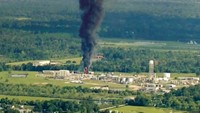Advertisement
Grab your lab coat. Let's get started
Welcome!
Welcome!
Create an account below to get 6 C&EN articles per month, receive newsletters and more - all free.
It seems this is your first time logging in online. Please enter the following information to continue.
As an ACS member you automatically get access to this site. All we need is few more details to create your reading experience.
Not you? Sign in with a different account.
Not you? Sign in with a different account.
ERROR 1
ERROR 1
ERROR 2
ERROR 2
ERROR 2
ERROR 2
ERROR 2
Password and Confirm password must match.
If you have an ACS member number, please enter it here so we can link this account to your membership. (optional)
ERROR 2
ACS values your privacy. By submitting your information, you are gaining access to C&EN and subscribing to our weekly newsletter. We use the information you provide to make your reading experience better, and we will never sell your data to third party members.
Business
Chemical plants in the Carolinas and Virginia gird for Hurricane Florence’s fury
BASF and Chemours are shutting down facilities
by Rick Mullin
September 13, 2018

As Hurricane Florence barrels down on the coasts of North and South Carolina, chemical companies that C&EN reached as of Sept. 12 say they are executing well-established plans for severe weather for their facilities in those states.“We’re monitoring the progress of Hurricane Florence and have been implementing some preventative steps that are aimed to protect our employees and local communities and safeguard our operations,” says Bob Nelson, corporate communications manager at BASF.
The company has a standing emergency response plan, and staff are trained for adverse weather and other events, he says. BASF has several sites in areas that the hurricane may impact, including an R&D center in Research Triangle Park, N.C, and a polyacrylamide manufacturing plant in Suffolk, Va.
“They are well versed in this,” Nelson says. It’s not the first time the plants have carried out the emergency response plans, he adds.
The company’s North Charleston, S.C., dispersions and pigments plant has already shut down, Nelson says. Operations at the Suffolk plant will be idled on Sept. 14 and a crew to ride out the storm, including operation, maintenance, and security personnel, will remain on site until the storm passes.
Chemours sent C&EN a statement saying the company is preparing its Fayetteville, N.C., fluoropolymers facility for hurricane-related flooding and high winds. Workers at the site, which is about 130 km from the coast of the Atlantic Ocean where Hurricane Florence is expected to come ashore, will clear equipment of remaining product and shut down manufacturing units before the evening of Sept. 13.
Chemours plans to have its sites cleared and secured 24 to 48 hours before the storm is expected to hit. A team of essential personnel will be sheltered in place during the storm and start-up will commence once conditions are deemed safe, the company says.
Lindau Chemicals, a small specialty organics producer in Columbia, S.C., about 190 km from the coast, is preparing for heavy storm conditions but had no plans to shut down as of Sept. 11. The company’s international shipping, which routes through Charleston, S.C., a city along the Atlantic, is a concern, however, according to Bill Cranford, the company’s president.
“We’re trying to ship everything we can before the storm hits,” Cranford says. “But we don’t think we’re going to be hit too badly.”
None of the chemical industry’s severe weather plans have been significantly altered since last year’s Tropical Storm Harvey pummeled the Houston area, where some larger corporations have plants that fared well through that natural disaster’s flooding and high winds. In the wake of the heavy damage Harvey caused to some facilities, the U.S. Chemical Safety & Hazard Investigation Board last November urged companies to reassess their preparedness for hurricanes and floods.







Join the conversation
Contact the reporter
Submit a Letter to the Editor for publication
Engage with us on Twitter